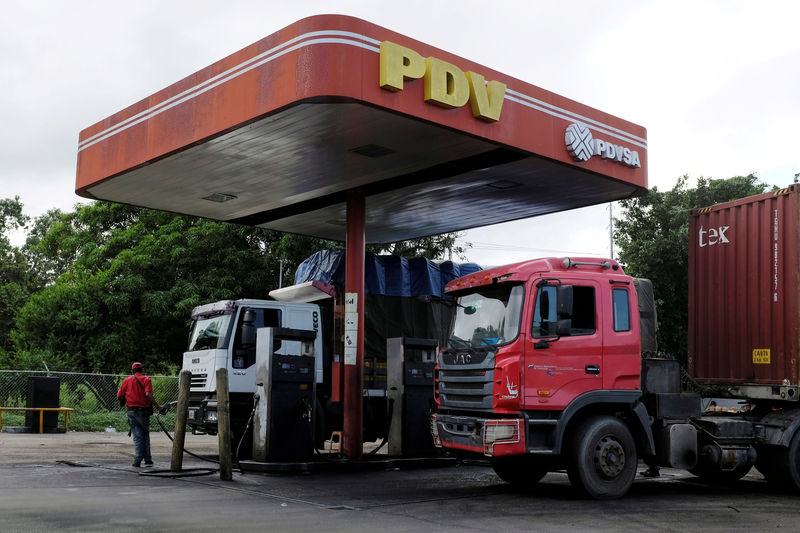By Ana Isabel Martinez and Maria Ramirez
CARACAS/CIUDAD GUAYANA, Venezuela (Reuters) - As oil companies and traders worldwide tried to decipher the impact of U.S. sanctions slapped on Venezuelan state oil company PDVSA earlier this week, residents of the South American country had a familiar response: Get in line.
Snaking, sometimes hours-long lines formed outside PDVSA gas stations amid concerns that the sanctions, intended to pressure socialist President Nicolas Maduro to step down and allow opposition leader and self-proclaimed president Juan Guaido to hold elections, would choke off fuel supply.
"I am going to fill up on gasoline just in case, because of the United States sanctions and because this country's refineries do not work," said Alberto Avila, a 52-year-old elevator technician waiting in line for gas at a still-unopened station in eastern Ciudad Guayana.
While the OPEC nation holds the world's largest crude oil reserves, intermittent gasoline shortages and long lines for groceries and medicine have become the new normal under a hyperinflationary economic collapse. Crude output is collapsing due to underinvestment, refineries operate well below capacity, and the country must import gasoline, mostly from the United States, to meet domestic demand.
PDVSA now buys about half the gasoline Venezuela needs, according to internal company figures. In the first eight months of 2018, imports from the United States rose 76 percent to 125,000 barrels per day, data from the U.S. Energy Information Administration show.
The sanctions, imposed on Monday, ban U.S. refineries from buying oil from PDVSA unless they pay the money to accounts not affiliated with the Maduro government, which Washington accuses of corruption and human rights violations. They also prevent U.S. companies from exporting goods or services to PDVSA.
PDVSA assured Venezuelans in a Twitter post that fuel supply would be guaranteed across the country, and many stations were operating normally, attendants said.
But some motorists like Carmen Lopez, a 51-year-old dentist, decided it was best not to try their luck. She left her house in the central city of Valencia at 6 a.m. and waited an hour to fill up.
"I do not really understand how the new sanctions are going to affect us, but just in case I am keeping my tank full," she said.
PDVSA board member Wills Rangel told Reuters the company was already having problems unloading fuel imports from tankers for domestic use because the sanctions were making it difficult to complete payments. Rangel, also a union leader, said the company had inventories to cover about a month's worth of consumption, but sources within PDVSA estimate stocks are closer to 15 days.
While Venezuelans were wary of how the sanctions might affect their already shaky access to basic goods, some opponents of Maduro were willing to put up with it because they thought the restrictions would hasten his exit.

"This cannot go on," said Antonio Rodriguez, a 55-year-old merchant in the 12th spot in line to enter a Caracas PDVSA station where only two of five pumps were working. "But if it is for the good of the country, we have to make the sacrifice."